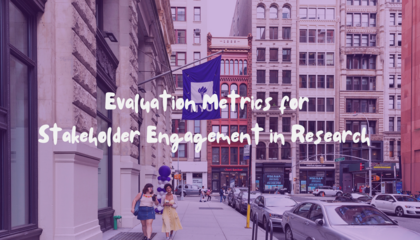
Why measure partner engagement in research?
Researchers often develop and conduct studies with partners who are interested in the research topic. These partners may include
- Patients
- Family members and friends of patients who help them out on a regular basis (e.g., caregivers)
- Clinicians, such as doctors and nurses
- Groups that work to improve care for specific health problems
- Health systems, or organizations that include at least one hospital and one group of clinicians
- Insurance companies
- People who know a lot about the research topic
- Community organizations
Engagement is the involvement of patients and other partners in the research process. Partners may help decide what topic to study and what questions a study should answer. They may suggest what treatments to compare, or who should be in the study. They may also give input on how to recruit people and keep them involved in the study, interpret study results, or plan for how to share results with others.
Depending on the research study, the level of partner involvement may be high or low. No standard way exists to find out how involved a partner has been in a study from the partner’s perspective. The Research Engagement Survey Tool (REST) is a way to measure the level of partner involvement in a research study. It places the level of partner involvement in one of five categories, from least to most involved: (1) outreach and education, (2) consultation, (3) cooperation, (4) collaboration, or (5) partnership.
How can this project help improve research engagement methods?
Researchers can use the REST to find out how involved partners are in a study and compare their level of involvement between studies or within a study over time. The REST has been comprehensively validated (see publications).
More Information about this study is on the Patient-Centered Outcomes Research Institute (PCORI) Study Page and in this Webinar for the CDC evaluation network about REST by Dr. Goodman
The REST is aligned with 8 Engagement Principles
1) Focus on community perspectives and determinants of health
2) Partner input is vital
3) Partnership sustainability to meet goals and objectives
4) Foster co-learning, capacity building, and co-benefit for all partners
5) Build on strengths and resources within the community or patient population
6) Facilitate collaborative, equitable partnerships
7) Involve all partners in the dissemination process
8) Build and maintain trust in the partnership
Source: Goodman, M. S., Ackermann, N., Bowen, D. J., Members of the Delphi Panel, & Thompson, V. L. S. (2020). Reaching Consensus on Principles of Stakeholder Engagement in Research. Progress in Community Health Partnerships: Research, Education, and Action, 14(1), 117–127. https://doi.org/10.1353/cpr.2020.0014
REST items
Final Comprehensive Research Engagement Survey Tool (REST)
Research Engagement Survey Tool (REST) 9 Item Condensed Version
Instructions for REST Scoring
REST has 2 scoring approaches.
- The first approach, aligned with EPs, is scored by taking the mean of the 3-5 items for each EP to get EP-specific scores and then taking the overall mean of the EP means to get an overall REST score.
- The second scoring approach aligns REST with the categories of engagement, developed during the Delphi process, based on the percentage of item responses that are aligned with each of 5 categories: (1) outreach and education, (2) consultation, (3) cooperation, (4) collaboration, and (5) partnership.
Statistical Software Code for REST Scoring
Information on scoring and interpretation can be found in the Partner Engagement Full Data Report and Partner Engagement Report Explanation Video below.
For more information about the project and access to data
Survey Instrument
Survey Validation
Addressing the Measurement Challenge
Cognitive Response Interview
Developing and Validating Quantitative Measures to Assess Community Engagement in Research: Addressing the Measurement Challenge, United States, 2017-2020 (ICPSR 38493)
Project Publications
- Goodman, M. S., Ackermann, N., Bowen, D. J., & Thompson, V. S. (2020). Reaching Consensus on Principles of Stakeholder Engagement in Research. Progress in community health partnerships: research, education, and action, 14(1), 117-127. Full Article
- Goodman, M. S., Ackermann, N., Bowen, D. J., & Thompson, V. (2019). Content validation of a quantitative stakeholder engagement measure. Journal of community psychology, 47(8), 1937-1951. Full Article
- Thompson Sanders, V. L., Ackermann, N., Bauer, K. L., Bowen, D. J., & Goodman, M. S. (2020). Strategies of community engagement in research: definitions and classifications. Translational Behavioral Medicine. ibaa042, Full Article
- Thompson VLS, Leahy N, Ackermann N, Bowen DJ, Goodman MS Community partners’ responses to items assessing stakeholder engagement: Cognitive response testing in measure development. PLoS ONE. 2020 15(11): e0241839. https://doi.org/10.1371/journal. pone.0241839 Full Article
- Goodman, M.S.; Ackermann, N.; Pierce, K.A.; Bowen, D.J.; Thompson, V.S. Development and Validation of a Brief Version of the Research Engagement Survey Tool. Int. J. Environ. Res. Public Health 2021, 181, 20. https://doi.org/10.3390/ijerph181910020 Full Article
- Goodman, M.S., Ackermann, N., Haskell-Craig, Z. et al. Construct validation of the Research Engagement Survey Tool (REST). Res Involv Engagem 8, 26 (2022). https://doi.org/10.1186/s40900-022-00360-y Full Article
Related Publications
- Melody S Goodman, Vetta Thompson, Cassandra Johnson, Renee Gennarelli, Bettina Drake, Maranda Witherspoon, Pravleen Bajwa, Deborah Bowen. Evaluating Community Engagement in Research: Quantitative Measure Development. Journal of Community Psychology 2017; 45(1): 17-32. [PMCID: PMC5749252]
- Melody Goodman, Vetta Thompson. The science of stakeholder engagement in research: classification, implementation, and evaluation. Translational Behavioral Medicine 2017; 7(3): 486-491 Full Article
- Deborah Bowen, Travis Hyams, Melody Goodman, Kate West, Julie Harris-Wai, and Joon-Ho Yu. Systematic review of quantitative measures of stakeholder engagement. Clinical and Translational Science 2017; 10(5): 314-336. Full Article
Publications Using REST
- Haroutounian, S., Holzer, K. J., Kerns, R. D., Veasley, C., Dworkin, R. H., Turk, D. C., Carman, K. L., Chambers, C. T., Cowan, P., Edwards, R. R., Eisenach, J. C., Farrar, J. T., Ferguson, M., Forsythe, L. P., Freeman, R., Gewandter, J. S., Gilron, I., Goertz, C., Grol-Prokopczyk, H., Iyengar, S., … Vollert, J. (2024). Patient engagement in designing, conducting, and disseminating clinical pain research: IMMPACT recommended considerations. Pain, 165(5), 1013–1028. Full Article
- Yuan, C. T., Daumit, G. L., Cooper, L. A., Cook, C., Corches, C., Dalcin, A. T., Eidman, B., Fink, T., Gennusa, J., Goldsholl, S., Liebrecht, C., Minahan, E., Osorio, B., Smith, S. N., Wang, N. Y., Woltmann, E., & Kilbourne, A. M. (2024). A Community-Engaged Process for Adapting a Cardiovascular Health Intervention for Persons with Serious Mental Illness. Ethnicity & disease, DECIPHeR(Spec Issue), 27–34. Full Article
- Berrios, C., McBeth, M., Bradley-Ewing, A., Schuetz, N., Campbell, A., Talebizadeh, Z., Garrett, J. R., Falicov, T., Martinez, F., Rare Voices Advisory Group, & Hurley, E. A. (2024). Developing a community-led rare disease ELSI research agenda. Orphanet journal of rare diseases, 19(1), 23. Full Article
- Hoke, A. M., Rosen, P., Pileggi, F., Molinari, A., & Sekhar, D. L. (2023). Evaluation of a stakeholder advisory board for an adolescent mental health randomized clinical trial. Research involvement and engagement, 9(1), 17. Full Article
- Williams, N. J., Gill, E., Punter, M. A., Reiss, J., Goodman, M., Shelley, D., & Thorpe, L. E. (2022). Rapid Community Engagement in Response to SARS-CoV-2 Funding Opportunities: New York City, 2020‒2021. American journal of public health, 112(S9), S904–S908. Full Article
Funding
This work was supported through a Patient-Centered Outcomes Research Institute (PCORI) Award (ME-1511-33027). All statements in this presentation, including its findings and conclusions, are solely the authors’ and do not necessarily represent the views of PCORI, its Board of Governors, or its Methodology Committee.

